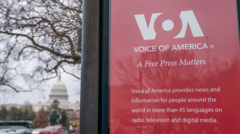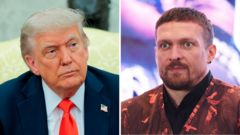This article discusses the implications of President Trump’s recent directive to reduce funding and staffing at Voice of America (VOA), a historic news organization aimed at countering propaganda, amid allegations of bias.
**Trump's Move to Dismantle Voice of America Sparks Concerns Over Press Freedom**

**Trump's Move to Dismantle Voice of America Sparks Concerns Over Press Freedom**
US President's order to curtail the funding and operations of Voice of America raises alarms regarding independent journalism.
In a significant move that has stirred controversy, US President Donald Trump has signed an order aimed at reducing the operational capacity of Voice of America (VOA), a federally funded news organization founded during World War II. The president has accused VOA of harboring anti-Trump sentiments and propagating radical viewpoints. The order reflects Trump’s ongoing criticisms of what he perceives as bias in mainstream media.
The White House has described the directive as a measure to ensure that taxpayers do not financially support what they term “radical propaganda.” This decision affects the US Agency for Global Media (USAGM), which oversees VOA and other media outlets, instructing its managers to minimize operations to the legal requirements. VOA's current director, Mike Abramowitz, has stated that he and nearly 1,300 employees are now on paid leave, effectively halting their ability to fulfill the organization’s critical mission—especially in a time when adversaries are actively working to undermine American credibility through misinformation.
The implications of Trump’s decision have drawn sharp rebukes from various quarters, including the National Press Club, a significant professional association for journalists in the United States. Their statement emphasized that this order threatens the very foundations of an independent press, highlighting the vital role that institutions like VOA play in global communications. They argued that if an entire newsroom can be rendered sidelined overnight, it demonstrates a worrying trend that jeopardizes press freedom.
In a parallel development, notifications have been sent to freelancers and international contractors associated with VOA, announcing the sudden cessation of funding for their work. Additional reports indicate that this directive has led to the termination of federal grants for Radio Free Europe and Radio Free Asia, both entities that also fall under the USAGM umbrella and were historically established to counteract communist propaganda.
International reactions have surfaced as well. Czech Republic's Foreign Minister, Jan Lipavský, expressed concerns regarding the potential operational challenges faced by Radio Free Europe/Radio Liberty and suggested that the European Union could play a role in their continued functioning.
This latest controversy complements Trump’s broader agenda of criticizing mainstream media outlets, which he labels as "corrupt" or biased against his administration. His appointment of loyalist Kari Lake as a special adviser to the USAGM has further raised eyebrows about the administration's motives.
Voice of America, which aims to provide unbiased information worldwide, has long stood as a symbol of American commitment to free expression. Established in 1942, its mission remains crucial in a world rife with misinformation. As President Trump intensifies efforts to reshape federal support for media outlets, this decision could have lasting ramifications for the landscape of American journalism and international communication.




















